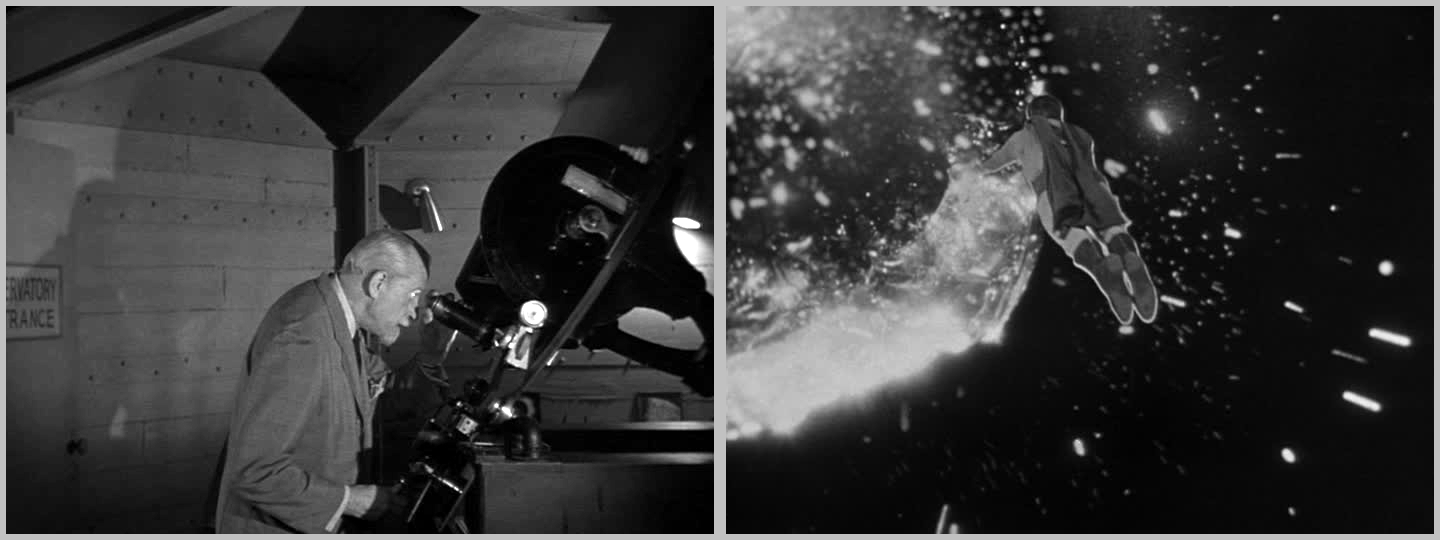|
Panic
In The Sky — Epilogue
by Tom Nichol
Based on the episode of the same name
in the
Adventures of Superman,
1953.
Ten
days had elapsed since the destruction of the huge asteroid which
had come so frighteningly close to destroying both Superman and
Earth itself. After numerous discussions with Professor Roberts
at the Metropolis Observatory, the Last Son of Krypton and the
Professor had finally agreed upon a full explanation as to what
had happened and why.

In
his secret identity of Clark Kent, the Man of Steel was finally
ready to submit that explanation to Perry White, owner/publisher
of the Metropolis Daily Planet. Lois Lane and Jimmy Olsen joined
the two in Perry’s private office to discuss the matter
before Perry submitted Clark’s manuscript to the Planet’s
composing room, where it would finally be turned into the story
that the Planet’s readers would see on the newspaper’s
front page the following day.
“So
the asteroid was actually a fragment of Krypton itself, Mr.
Kent?” Jimmy asked. Being an amateur scientist
himself, Jimmy was naturally interested in the more technical
aspects of the story.
“That’s
right, Jimmy,” Clark confirmed. “From what Superman
and Professor Roberts have been able to determine, the asteroid
must have followed directly behind the rocket ship which actually
brought Superman from Krypton to Earth.”
“But
how could that be, Clark?” Lois inquired. “Some sort
of magnetic attraction?”
“Not
quite, Lois,” Clark replied. “You see, from what
Superman has told me, that rocket ship was equipped with two
different propulsion systems. The first was basically a
chemically-fueled rocket engine very similar to those now being
used and further developed on Earth. That engine was designed to
take the rocket ship beyond the outer limits of Krypton’s
atmosphere and gravity field.”
“What
about the other engine, Clark?” Perry White asked.
“Yeah—and
why the need for two different propulsion systems?” Jimmy
added.
“Well,
we may never know all of the technical details,” Clark
answered, “especially since the ship destroyed itself not
long after its arrival on Earth. However, it appears to have been
some sort of faster-than-light design. As to the reason,
Professor Roberts has determined that the Kryptonian solar system
was located some 80 light years away from Earth. This made some
sort of faster-than-light travel essential if the ship was going
to reach our solar system in anywhere near a reasonable length of
time!”
As
his three colleagues gasped in astonishment, Clark went on,
“There is a distinct possibility that some sort of space
warp was developed as a part of the journey from Krypton to
Earth. It seems likely that, for whatever reason, the asteroid
was sucked along in the rocket’s exhaust trail during the
trip. Also, at some point along the way, the asteroid was somehow
knocked out of the ship’s trail before it arrived in our
solar system. Since it was no longer able to take advantage of
the rocket’s faster-than-light attributes, the asteroid
must have completed the journey at a considerably slower rate.”
“But,
Clark,” Lois put in, “if the asteroid was of
Kryptonian origin, shouldn’t it have been all Kryptonite?”
“Not
necessarily, Lois,” Perry interjected. “Given the
circumstances that Clark here has described, it’s quite
conceivable that, once the asteroid was no longer actually
following the rocket directly from Krypton, it might very well
have collided with one or more other astral bodies made from
other materials. Also, there is a chance that this particular
fragment of Krypton might have broken away from the mother planet
just prior to the explosion of the main body of the planet
itself, and therefore did not become completely radioactive. As
Clark has said, however, we may never know all the details for
sure. The important thing, however, is that our atomic scientists
were able to devise a way to safely destroy the asteroid once and
for all!”
As
the others nodded their agreement, a thought occurred to Jimmy.
While it wasn’t a pleasant one, he felt it had to be
explored. “Do you think there might be other Kryptonite
fragments out in space, Mr. Kent?” he reluctantly asked.
Clark’s
face turned grim as he replied, “Unfortunately, Jimmy, I’m
afraid that the answer is unavoidably yes. How many such
fragments there are, and what directions each one is traveling
in, remains to be seen. Hopefully, though, it’ll be a long,
long time before another radioactive fragment of Krypton comes
anywhere near our solar system, let alone Earth itself!”
Perry
nodded, then commented with a smile, “Well, let’s all
remember that happiness in life largely consists of refusing to
worry about matters we have little or no control over. Let’s
just all be thankful that this incident turned out the way it
did. And now,” he concluded, checking his wrist watch,
“let’s get this article down to the composing room,
and then head home for the day!” With smiles of their own,
Perry’s colleagues did just that.
Posted:
April 30, 2018
Jim
|